M.J. DeMarco's Blog, page 2
January 12, 2024
The Most Important Business Pivot is the One Made Before Starting
The idea of a business pivot is very popular in entrepreneurial subculture. The business pivot in normal nomenclature is the art of shifting gears during your business based on user feedback and data analysis.
However, what if the the most important business pivot was the one you made before even starting?
My stepson was a Generation Z young adult with no interest in business or entrepreneurship. I’ve tried to get him interested in owning his business and controlling his destiny for years.
No luck.
Everything changed after he graduated from college and got a full-time job.
Early morning wake-ups, traffic, low pay, corporate politics, passive-aggressive bosses, and boom! Suddenly, he wants to start a business.
As I like to say, words rarely can wake people up. Warning people about the fire doesn’t work; they need to stick their hand into it and get burnt.
In any event, when my stepson finally came to me for some feedback on a business idea, I showed him the following graphic:
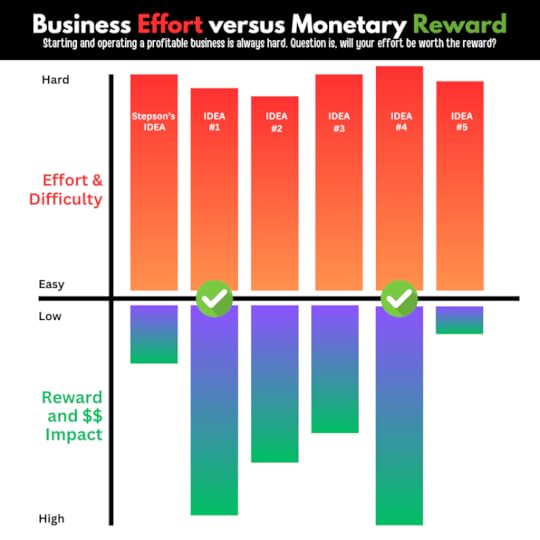
My stepson’s first business idea was related to agriculture—terribly hard to scale with equally difficult customer acquisition hurdles. His best-case scenario is a middle-class salary.
The best business to start (above) is Idea #1 and #4. The low rewards of the other ideas are not worth your effort.
You see, no matter what business you decide to launch, you will struggle and grind. The question is, will that work and grind change your life or pay your bills?
I mentioned this last year in an earlier newsletter in a parable of a mountain hike. You cannot avoid the treacherous hike up the mountain, but you can ensure your effort is handsomely rewarded.
People are running small corner cafes who work as hard as I but earn 100X less. Effort is not an issue; the answer lies in the graphic above.
Think that guru with a $3,000 course to sell you has the answer?
Wrong.
Here’s what you don’t see.
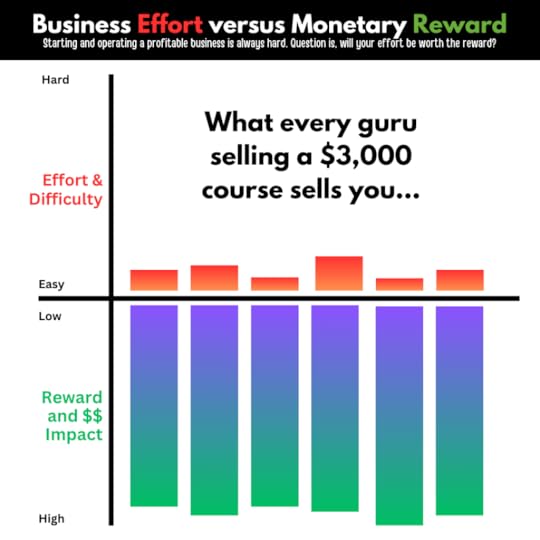

If you need a billionaire to convince you, Stephen Schwarzman, the CEO of Blackstone Group, which is a global private equity firm, said it best:
“I had reached an important conclusion about starting any business; it’s as hard to start and run a small business as it is a big one. You will suffer the same toll financially and psychologically as you bludgeon it into existence… so if you’re going to dedicate your life to business, which is the only way it will work, you should choose one with the potential to be huge.”
If you play the big-boy/big-girl game of business, be in the business of big rewards. Or work for the rest of your life, an outcome no better than a job.

MJ DeMarco
This article was from The Life in the Fastlane Newsletter. Click here to subscribe.
Want to discuss this topic? Visit the Fastlane Entrepreneur forum and chat about it!
December 22, 2023
Getting Rich; How to Really Do It; I Wish I Saw This When I Was 20.
For years, the idea of getting rich seemed impossible. When I was trying to figure things out, I wish someone showed me *THIS* when I was 20.
Back then, I thought becoming a millionaire, or better, 8-figure+ multimillionaire, is was just a fantasy. A task that felt extremely out of reach.
When I shifted my perspective from YEARS to DAYS, and YEARS to UNITS, everything changed.
These four charts below are the most profound understanding you can give your future self. If only someone had given me these charts as a kid—they prove amassing wealth quickly is surprisingly straightforward.
Getting rich, or wealth, is always perceived as a climb to Mt. Everest. But what if it was only just a daily walk in the park?
It becomes simplified when you break down wealth accumulation down to the day—sell something 50 times a day for only 5 years. Lessor goals are even easier—a millionaire is just 9 units daily for 3 years.
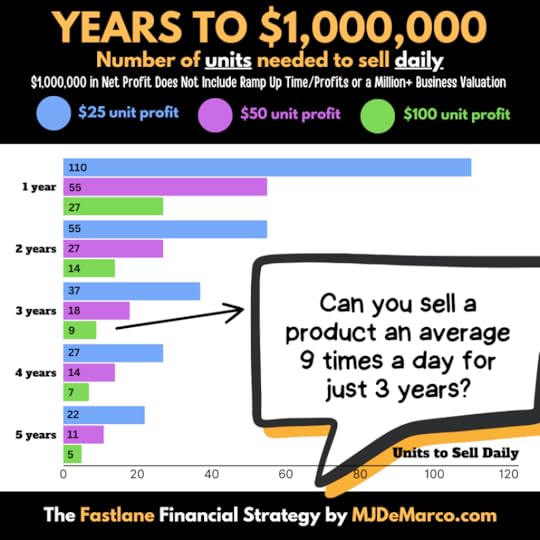 Getting rich: Number of units to sell daily to reach $1M
Getting rich: Number of units to sell daily to reach $1M
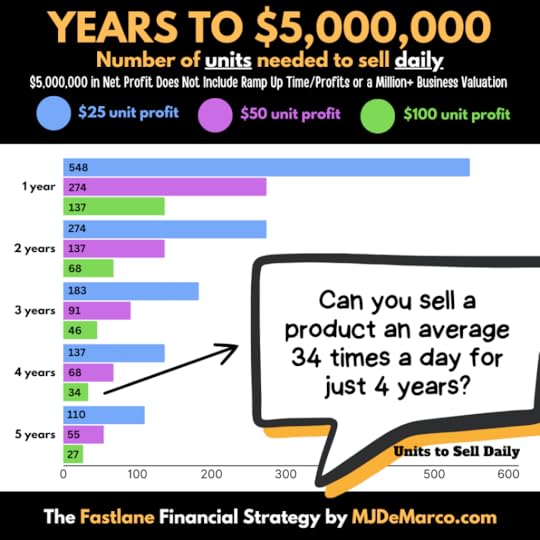 Getting rich: Number of units to sell daily to reach $5M
Getting rich: Number of units to sell daily to reach $5M
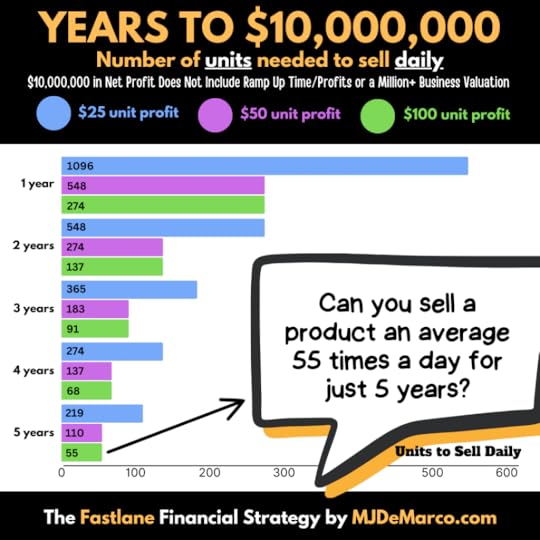 Getting rich: Number of units to sell daily to reach $10M
Getting rich: Number of units to sell daily to reach $10MBetter, none of this includes your company valuation, which is just icing on the cake. You’re getting paid to build a financial fortress on top of your income.
If you’re selling Y, X times per day, your company is likely worth 7 figures or more.
Think about that.
Your business effort not only COMPOUNDS in income potential per these charts, but also in asset valuation. If you company earns $250K per year, it is likely worth. In other words, your effort is reward an asset valuation, on top of the income earned. It’s like getting paid a bonus for getting rich.
As for what to sell X times per day, that also has been complicated to the Nth degree.
Look at this Etsy seller.
They’re not from Silicon Valley; they’re not tech wizards flush with VC funding. They’re not spending 3 years learning how to code.
They sell a product for $120 (now on sale), and with 13,000 reviews, they consistently sell.

If only 5% of their customers left reviews, we’re talking about 260,000 units sold.
That’s not just a number.
That’s a masterclass in reaching your financial dreams, one sale at a time. If they earn $10 profit on each board (it likely is more) they have created $2,600,000 in real wealth. And their business is likely worth $1,000,000 or more.
THIS MY FRIENDS, IS HOW YOU GET RICH.
You sell 10 things a day for 3 years. Need something simple to remember?
Sell X daily at Y profit for Z years.
Boom.
Or you can work until you are 87 years old and hope for 8% portfolio growth, all while avoiding inflation, stock market crashes, and other economic calamities. Look at this chart below. UNITS and DAYS versus YEARS and SAVINGS RATE.
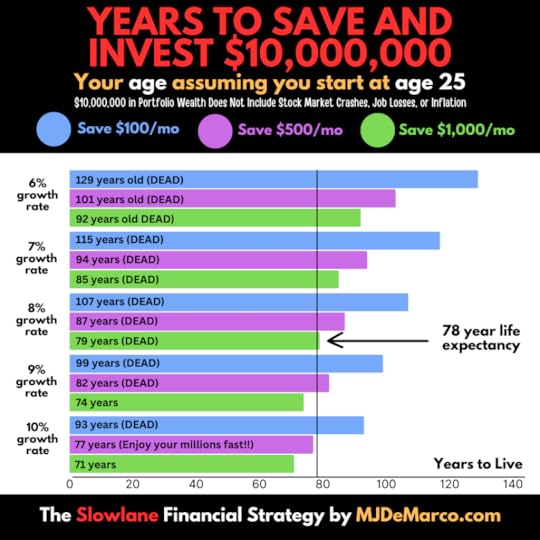 Getting rich: Number of years to invest monthly to reach $10M
Getting rich: Number of years to invest monthly to reach $10MWhen you compare these financial strategies for wealth accumulation, the comparison is laughable. It’s comparing an Elon Musk rocket to a 3-year-old’s tricycle.
There never has been an easier choice. And never a better option to free yourself from the tyranny of work, invest, wait, hope, and pray.
I hope you enjoyed these charts and, one day, you witness precisely what they represent. Feel free to share them.

MJ DeMarco, Entrepreneur and Author
This article was from The Life in the Fastlane Newsletter. Click here to subscribe.
Want to discuss this topic? Visit the Fastlane Entrepreneur forum and chat about it!
December 7, 2023
Has your life become unrecognizable?
Is your life unrecognizable compared to 6 years ago?
Going forward, what’s your likely destination? Joy, or regret?

If it isn’t, it’s time to re-evaluate your goals and your strategy.
Six years is enough time to totally transform your life.
In six years, you can become a piano maestro.In six years you can get so good at your sport you can make it to an Olympic games.In six years, you can start with nothing and build a 7,8, or 9 figure empire. People on the forum have literally done this. Here, here, here, here, here, and here — and most of them didn’t need 6 years. (The last 2 are INSIDER threads, subscription required)In six years, you can go from a nobody to an influencer with a gazillion followers and earn $2,000 for a 15-second plug. James Jani literally chronicled his YouTube start on the forum and now boasts nearly 2,000,000 followers. (He barely needed 4 years!)Or, in six years, you can look back and realize that you haven’t done a damn thing other than hope, pray, and wait for all the cards to fall your way.
I bring this up because I mentioned a crypto thread on the forum last week which was started 6 years ago. November 8th, 2017, to be exact. And now, with Bitcoin reclaiming yearly highs and earning back a portion of the 75% it lost the last 3 years, people like to proudly boast about their gains, while (likely) nothing else has changed in their life.
In reviewing that thread, I saw a lot of starry-eyed “investors” looking to get rich, and when BTC rises, people boldly proclaim their WINS, but oddly, disappear when it LOSES. Six short years have passed, and there are still people in that thread “waiting” for their big break.
184 pages of hope.
312 weeks of waiting.
2,190 days of praying.
Others have simply disappeared, their dreams of a better life likely dead with their crypto investments.
They are still waiting and hoping. And they will continue to wait and hope. Sadly, in all that time sitting around, they could have already accomplished miraculous things.
Six years holds an immense potential for transformation and profound personal or professional metamorphosis. Six years ago, you probably never heard of Alex Hormozi, or Mr. Beast, or Emma Chamberlain, or Sam Parr, or the companies that emerged: Figma, ConvertKit, Morning Brew, Canva, or Notion.
Six years can be a period of monumental change or growth.
Or a period of terrible waste.
Either way, TIME WILL PASS.
It waits for no one.
So why not JUST DO IT and put that time to use and create something memorable and life changing?
Question is, what will your next 6-years hold? Staggering change? Or will your best win of those six years be the $15,000 in gains you proudly made in Bitcoin, notwithstanding the inflationary purchasing power you lost in those 6 years?
Sure, investment gains of $15K is a win.
Waiting around 6 years for it, while nothing else in your life has changed?
Not a win.
The years will pass, irrespective of your choices. The question then becomes not if time will elapse but how you will utilize it so your future time won’t be consumed by regret?
Will it be a testament to your potential, a chronicle of dreams realized, or a reminder of chances not taken?
As I wrote in The Great Rat Race Escape, the canvas is blank, and the brush is in your hands. Will you paint a masterpiece of personal and professional fulfillment, or will the canvas remain untouched?
Don’t let another 6 years go by waiting, hoping, and praying.
START DOING.
MJ DeMarco
This article was from The Life in the Fastlane Newsletter. Click here to subscribe.
Want to discuss this topic? Visit the Fastlane Entrepreneur forum and chat about it!
October 19, 2023
Two shocking “gut-punches” you can use for life-long happiness.
My wife hates that I have an affinity for watching and reading about true crime stories. Turns out I’m not alone.
Anyway, there’s an odd reason I’m hooked on watching murder documentaries, and they lead to the two strategies I use to continually be happy and raise my baseline for happiness.
No, I don’t have some twisted fascination with crime. But it reminds me to not sweat the “small stuff,” and most everything is small.
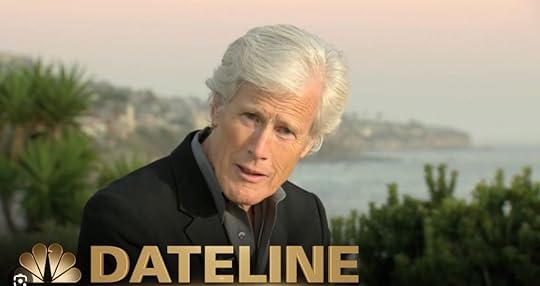
When I watch true crime documentaries, I look beyond the human tragedy (which my wife cannot do) and instead experience immense gratitude and perspective, two things that scientifically can lead to happiness.
True crime shows me how lucky I am to have my loved ones while being able to pursue my best life. It gives me a punch of perspective, a mental knife that cuts through the fog of trivial complaints and zooms in on what truly matters.
I recently did a Cameo video, a pep-talk for a man who was enduring struggles in his life. In that video, I tried to share these two ideas of gratitude and perspective, as they were the strategies that guided me during my rough times, as they do today when I’m complaining about tax increases, corrupt politicians, and rude people.
Take war, for instance. There’s someone, right now, literally fighting to survive. Conversely, you might be in a metaphorical battle to get that promotion or launch your startup. Recognize this for what it is—a privilege.
Think about that.
You’re fighting for a dream, while others are fighting for food, shelter, and water. They’re fighting to survive. If you’re currently able to fight for your dreams because you’re not busy fighting for your life, well, you’re doing spectacularly well.
The same can be said about health. I might dread the idea of my early morning walk, but hey, I *can* walk without the threat of being bombed, mugged, or kidnapped. Whenever I lose perspective, I mutter to myself, “Well, you don’t have pancreatic cancer,” which, by most measures, is a death sentence. This simple, morbid statement is another mental punch that knocks sense into me.
Another cognitive gut-punch I use is freedom, which most of us take for granted. When faced with the angst of some trivial matter—someone cut me off, scammed, or misled me—I tell myself that I’m not pacing in a prison cell convicted of manslaughter or subject to reeducation in some gulag while doing back-breaking labor. I’m still free to think, speak, and exist as I am, as are you. This simple autonomy is a cornerstone of your well-being that we too often overlook.
And let’s not forget the little black mirror we all carry—our smartphones. I preach a lot about social media toxicity but remember, the entire repository of human knowledge is literally in your pocket. Hell, if you had Elon Musk or Taylor Swift’s telephone number, you could immediately reach them from your pocket. Again, think about amazing truth. Between this knowledge and access, previous generations would’ve killed for this privilege. Don’t squander it with endless doom-scrolling on TikTok.
So when life beats you down—bills, tax increases, poor ad results—remember the THREE WARMS: If you have a warm bed after a warm shower following a warm meal, congratulations; you have a lot to be thankful for. You have an opportunity not just to survive but to pursue your dreams. Your best life.
None of this is some woo-woo I made up. The psychological benefits of gratitude and perspective are well-documented. One seminal study published in the Journal of Personality and Social Psychology found that participants who kept weekly gratitude journals were more optimistic, felt better about their lives, and exercised more than those who focused on neutral or negative aspects. The grass is already greener in your pasture. This research, led by Robert A. Emmons and Michael E. McCullough, lends scientific credence to the idea that focusing on what you’re thankful for can positively impact well-being (source).
Another study delved into how the mere act of reframing a situation—again, perspective— to see the silver lining could foster better mental health. Published in the Journal of Behavioral Medicine, this study suggests that optimistic thinking styles, like positive reframing, are associated with various health benefits, including lower levels of depression and even better cardiovascular health (source).’
In a world where the narrative is often tuned to what we lack or how we could be better, flipping The Script is not radical but revolutionary. The powers-at-be want you to be angry, divided, and depressed as it makes you controllably monetizable. Don’t be a slave to their whims.
So here’s the mic-drop that only perspective and gratitude can deliver: If you’re physically, mentally, and geographically able to pursue your dreams—your best life— you’re already living the dream.

Best wishes,
MJ DeMarco, Entrepreneur, Author
PS: Here are some questions to ponder regarding perspective and gratitude in your life.
1) How can you practice gratitude daily beyond acknowledging our current treasures in life?
2) How do you balance a heightened sense of perspective for happiness so it does not deter you from achieving more?
3) How does the digital age contribute to our skewed perspective, and how can we counterbalance that?
September 27, 2023
Discipline: Go from Dummy to Expert in a Matter of Months…
Imagine having a map to buried treasure, a journey that can change your life in unimaginable magnitude. And yet, after close examination of the map, you decide to sit home and do nothing because the journey looks difficult, or the journey doesn’t come with a mentor that will hold your hand.’
This scenario best describes how most people approach life, and their refusal to embrace their personal power. The fact is, DISCIPLINE has replaced LUCK as the sole thing that stops you from succeeding.
A century ago, education and knowledge was a privilege secured from birth, and having the LUCK to be born in the right family in the right city.Today, the world’s knowledge is at your fingertips and readily accessible with a computer or a smartphone.
Per market researcher eMarketer, 63% of adults on the planet have smartphones— but those phones aren’t making them smarter, they are making them dumber.
A great startup story of this truth comes from Moiz Ali, the founder of Native Deodorant which sold to P&G for nine-figures in 2020. Codie Sanchez tweeted (X’d) a great write up of the story which featured the following statement from Moiz.
“I know nothing, and in six months, I’m going to become one of the world’s leading experts on deodorant. I’m just going to spend my time learning, and I’m going to figure it out.”
Moiz Ali, Founder, Native
You see, DISCIPLINE is the only thing required to unlock a treasure trove of resources, resources which can change your life forever.With the right commitment and focus, you can go from dummy to expert in a matter of months.
Or, you can continue to spend 5 hours a day on TikTok, X, and Netflix while complaining you don’t have the skills to change anything. Sorry, you don’t have the discipline to change anything and until you do, nothing will change.
So how do you become disciplined? Someone asked this in the Unscripted Telegram Network to which I posited, the better question is to ask, “What PREVENTS you from being disciplined?”
If you want to be more disciplined, examine the enemies of discipline… and then remove or defeat those enemies.
Poor Environment: A great example was when I lived in Chicago – I couldn’t be disciplined there so I moved to Arizona, an environment which narrowed my focus and strengthened commitment.
Distractions: Distraction is now a business model. Everything is engineered to harvest your focus and attention which is revenue for many companies, and a distraction for you. The more successful these companies are with their high-paid psychological operatives in stealing your attention, the less successful you become. Remove distractions; delete TikTok, cancel the Netflix, and dump the Roblox subscription.
Lack of Purpose: If you were sitting on the railroad tracks and a train was steaming toward you, how hard would you find it to be disciplined? How hard would it be to have a purpose (I don’t want to get run over by a train!) You see, when you discover your purpose, no matter how vague or specific, discipline becomes as urgent as jumping off the train tracks. Purpose comes with two AWESOME COMPANIONS: companion: discipline and happiness.

The power to change your circumstances is within your control, and within your access.
Unprecedented times.
Take advantage now and let your smartphone make you smart, or allow the world’s psychological manipulators to make you dumb.

MJ DeMarco, Entrepreneur, Author
Want to discuss this topic? Visit the Fastlane Entrepreneur forum and chat about it!
September 13, 2023
Fact: Your system is more important than your effort.
The most important concept for obtaining financial freedom has nothing to do with your effort. Take note as I tweeted this, posted it in the Telegram Group, the forum, and here as the newsletter.
Let me repeat: YOUR SYSTEM is more important than your EFFORT.
I realize that might be controversial, but it isn’t when you consider that the fastest man on earth is NOTHING when hindered by a poor system.
The most powerful factor in wealth creation has nothing to do with motivation.
It has nothing to do with effort, persistence, discipline, or the usual suspects commonly pushed.
While these help, the most important thing is likely something you never considered.
It’s this…
The most powerful tool for wealth creation is within the SYSTEM you put yourself in. Your choices dictate the system.
For example, if you elect to get a job as an electrician, that’s a system.
A doctor? A system.
A cashier? It’s a system.
Nurse? You’ve given yourself a system.
Likewise, electing to be an entrepreneur also endows you with a system.
Starting a sandwich shop on the corner? System.
Starting a software company? System.
Joining an MLM to sell overpriced goods and far-fetched fantasies? System.
Starting a YouTube channel? System.
Self-endowed systems go beyond jobs and business. An aspiring actor is part of a system. Artists. If you become a politician and are elected, congratulations; you’re now part of a system. Enter office with a net worth of $1M, leave 15 years later with $250M.
Ultimately, the SYSTEM determines how your EFFORT, motivation, and discipline compounds into momentum, or lack of it. The SYSTEM determines if you have access to asymmetrical leverage–which creates wealth- or no leverage at all.
What leverage does your system offer? Or does it?
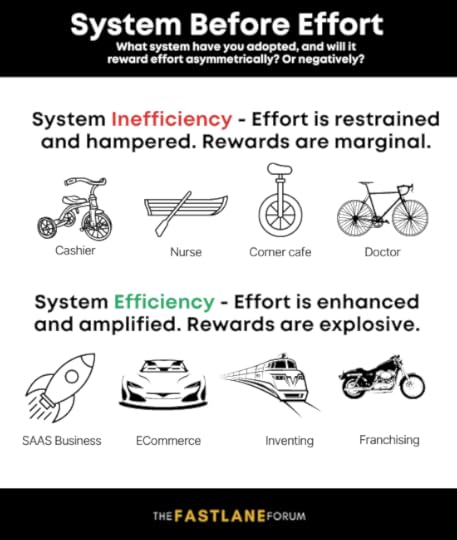
The best analogy of the SYSTEM/EFFORT Concept is equate your system to a vehicle.
Many jobs are like a tricycle.
If you throw Usain Bolt on a tricycle, you’d beat him in a race. Did he suddenly get slow? No, the problem is a poor system suddenly marginalizes his EFFORT.
So many people work harder and longer than myself. And they’re more talented. Their work ethic isn’t the issue; it’s that the system they’ve adopted hinders their effort.
Want to get paid what you’re worth? Change your damn system and get off the tricycle.
This is why Fastlane Entrepreneurship is the most potent SYSTEM; it’s a system swap where your effort compounds and gives asymmetrical leverage a chance. A great effort in the JOB SYSTEM gives you a 4% raise. A great effort in a BIZ SYSTEM gives you a 4000% raise.
SYSTEM > EFFORT > MOMENTUM (via Compounding)
Choose wisely.

MJ DeMarco
Want to discuss this topic? Visit the Fastlane Entrepreneur forum and chat about it!
August 13, 2023
5 Crucial Life Lessons that Could Save or Make You Millions.
If you liked my rewrite of the old “Mexican Fisherman” parable, (The Mexican Fisherman has Filed for Bankruptcy) you’ll like this rewrite. It has 5 crucial life lessons that could save, or make you millions. Here it is:
A grandmother congratulated her granddaughter on graduating college. She told her, “I want to give you a graduation present. It is an old painting we’ve had in the family for years. It is yours, but before you decide what to do with it, I want you to understand what it is worth.”
The granddaughter examined the picture, which was slightly larger than a paper notepad and featured a portrait of a Victorian woman. Its frame was golden and gaudy, certainly not something she’d hang in her apartment.
Her grandmother continued, handing her daughter a list, “Here are four locations that will help you find its value. The first option is the estate sale I’m holding next week. You’ll be on your own for the last three places. Don’t make a decision on what to do with the picture until you’ve visited all four places.”
The following week, the grandmother had her estate sale, the first item on the list. As instructed, the granddaughter used the opportunity to offer the picture for sale. A bold sign declared below the picture, “Make offer.”
After three days, the top offer was $250.
The following week, the granddaughter took the painting to a local pawn shop, the second item on her grandmother’s list. After some haggling, the pawn shop offered her $500.
Afterward, the granddaughter felt a bit jaded. She hoped her graduation gift from her grandmother would be an iPhone, not a portrait of some old woman who had been dead for centuries.
She proceeded to the next stop on her list, an art gallery in the city.
She walked into the shop and showed the curator the portrait. The curator’s eyes widened, and she quickly grabbed her loupe to examine the picture closer. The curator studied every inch of the picture, her eyeballs glued to the magnifying glass as if reviewing a fine diamond. The granddaughter was getting impatient and was bored out of her mind.
After 20 minutes of thorough examination, the curator finally spoke, “May I ask where you got this?” The granddaughter replied nonplussed, “It was gift from my grandmother. It’s been in the family for a while.”
“I see,” the curated paused and then smiled. “I can offer you $10,000 for this.”
The granddaughter’s eyes gaped like saucers. “$10,000?”
“Yes,” the curator said, “Would you like me to write you a check?”
The granddaughter thought about all the great things she could buy with $10,000. A new iPhone. A down payment on that new Audi she had her eye on. She was about to accept the offer when she remembered her grandmother’s instructions. “Don’t make a decision until you’ve visited all four places.”
The granddaughter thanked the curator for the offer and walked out, saying she would be in touch.
The granddaughter reviewed the last location on her grandmother’s list the next day. It required a 5-hour drive to New York City, and she arrived late. The establishment’s name sounded familiar when she glanced at it initially, but it wasn’t until she stood outside the building that she realized what it was. It was Sotheby’s, the international auction house.
She walked in and promptly explained that she wanted an appraisal. When she showed the small picture to the receptionist, her face froze. She quickly picked up the phone and mumbled something to someone on the other end.
“Hi I’m Damien, President of Acquisitions,” said a well-suited man minutes later in a thick French accent. After exchanging pleasantries, Damien asked, “Now let’s see what you got here.”
Like the curator did the day before, Damien examined the picture, eye to canvas, with his loupe in excruciating detail accompanied by a series of verbal “oohs” and “ahhs.”
Finished, Damien finally said, “This is a portrait by Edgar Degas, a renowned French impressionist painter. It is a highly sought piece in the art community. We sold his “Les Choristes” painting for $37 million in 2019. If you consign this to us here at Sotheby’s, the minimum starting bid would be $1,000,000.”
Damien smiled and continued, “in our current robust market, this should fetch a tidy sum, much more than that.” He paused. “Shall I draw up the contract?”
The granddaughter left without a contract and visited her grandmother, shell-shocked and giddy at the discovery.

“Did you know how much this is worth?” the granddaughter asserted.
The grandmother replied calmly, “I know how much you’re worth. I wanted you to understand that your value, like this picture, depends on you being in the right place. If you don’t feel valued in your job, by your boyfriend, or by your friends, don’t get upset, it just means you might be in the wrong place. Don’t sell out any part of your life just because the offer before you is convenient and tolerable.“
The parable has several takeaways, and here they are if you missed them:
1) Context and Environment Matter
Your value and the value of your offer depends on the environment and context in which you place it. Selling cold water in Phoenix, Arizona, differs from selling it in Anchorage, Alaska. Most marketing campaigns fail not because of poor messaging but because of poor context and environment. You could create the best beef jerky in the world, but attempting to sell it at a plant-based convention is like taking an Edgar Degas masterpiece to a pawn shop. Are you, or your offer, in the right place?
2) The Curse of Ignorance Causes Poor Decisions
Lack of knowledge can be costly. The best decision-making is done when you have thoroughly researched a topic or a decision and have all the information. What decisions should you not make until more information is obtained?
3) Value is Subjective and Indifferent to Your Personal Tastes
A topic discussed in The Great Rat Race Escape: Not everyone loves coffee. Just because you think coffee is the best drink in the world, doesn’t mean everyone has to agree with you. Just because you think a piece of artwork is atrociously ugly doesn’t mean a billionaire in Austria hates it too. What personal tastes do you hold that might be distorting your view of the market?
4) Don’t Fear Bigger Numbers: The Leap of Zeroes
What seems like a lot of money to you ($10,000) might be nothing to someone else. A limited view of money will limit your ability to attract what you’re worth. $10,000 to the granddaughter felt like a life-changing amount. To the auctioneer who deals with billionaires, it’s petty cash. Twenty five years ago $10K was a lot of money to me. Now, it feels like nothing. Is your limited view of money distorting your true value, or the value of what you can bring to the table?
5) Going the Extra-Mile Might Deliver a Light-Year Result
Decades ago, when I sold my first company, the first offer was $250,000. I was patient and went the extra mile and sought more suitors. The final proposal was nearly 5X more. Patience and diligence yielded a $1M return in less than three months.
Where can going extra mile yield a 5X return in your life?

MJ DeMarco
Want to discuss this topic? Visit the Fastlane Entrepreneur forum and chat about it!
July 6, 2023
The Mexican Fisherman Story and What Really Happened Later…
Beware of romanticized parables that convince you to adopt a dangerous financial strategy devoid of any reality in today’s world.
One such story is the “Mexican Fisherman” parable I scrutinized in Unscripted over 5 years ago. Today, this parable is being enthusiastically circulated around the web as some modern “lifestyle doctrine” you should adopt without question or critique.
 The Mexican Fisherman Story – Dangerous Idealism or Real?
The Mexican Fisherman Story – Dangerous Idealism or Real?However, for most people, this parable has become a risky and convenient excuse for sloth and poor financial planning.
If you haven’t heard the “Mexican Fisherman” story, it goes like this:
A businessman stood at the pier of a small coastal Mexican village when a small boat with just one fisherman docked. Inside the small boat were several large yellow-fin tuna. The American complimented the Mexican on the quality of his fish."How long did it take to catch them?" the businessman asked."Only a bit," the Mexican replied."Why don't you stay out longer and catch more fish?" the businessman then asked."I have enough to support my family's immediate needs," the Mexican said."But," the businessman asked, "what do you do with the rest of your time?"The "Mexican Fisherman" said, "I sleep late, play with my children, take a siesta with my wife, take evening strolls to the village, where I sip wine and play guitar with my amigos. I have a full and busy life, señor."The businessman scoffed, "I have a Harvard MBA, and I could help you. You should spend more time fishing, and with the proceeds, you buy a bigger boat, and with the proceeds from the bigger boat, you could buy several boats. Eventually, you would have a fleet of fishing boats. Instead of selling your catch to a middleman, you could sell directly to the consumers, eventually opening your own cannery. You would need to work a bit longer and harder in the big city, but you would control everything."The "Mexican Fisherman" asked, "But señor, how long will this all take?"To which the businessman replied, "Five to ten years.""But what then, señor?"The businessman laughed and said, "Well, that's the best part. When the time is right, you would sell your company and become very rich; you would make millions.""Millions, señor? Then what?"The businessman said slowly, "Then you would retire, move to a small coastal fishing village, where you would sleep late, play with your kids, take a siesta with your wife, take evenings strolls to the village, where you could sip wine and play guitar with your amigos…"Sounds pretty cool, eh? This story emphasizes noble things such as friends, family, and free time. It is no surprise why it is such a viral trope.
The problem is, this story lacks any connection to real life.
It is entirely idealistic to the point of being dangerous. Such idealism might work in when you’re 23 years old, but as you get older, this type of strategy is the same as thinking your first winning hour at the casino will continue for the next 8 hours.
Here’s the rest of the story you didn’t here:
Soon after the businessman left, things changed. The government, desperate for tax dollars, levied a series of boating, gaming, and license fees: To continue fishing, the Mexican must pay $400 for a fishing license, a $200 environmental fee, a $350 game endorsement, and $1,800 in mooring fees. If he doesn't pay ASAP, the Mexican will be barred from fishing.Unfortunately, after paying all the fees, the Mexican has little money left to insure and license his boat. Unable to legally operate in his favorite coastal town, the "Mexican Fisherman" drives three hours south to another town, where the quality of the fish is poor. The long drive takes its toll on the Mexican's car, where it ultimately breaks down. To fix his car, he needs $300 for a water pump and $600 for a radiator. This is after he pays $400 to get his car towed back to his village.But this story is about to get worse.Instead of making the money to fix things that needed fixing, the fisherman's home is in a constant state of disrepair, from the eroding concrete pilings to the rotting roof, the Mexican is in town fiddling away at his guitar. A hurricane strikes his tiny village and demolishes his home, leaving him and his family homeless.For the next month, his family is stuck living in squalid government tents, and as a result, the Mexican fails to pay the mooring fees for his boat. The "Mexican Fisherman" who spent most of his days in unpreparedness and merriment—strumming around with his friends, sipping wine—now has no money or options to escape his plight. Tired of his sloth and inability to provide the basics to his family, his wife divorces him.The fisherman now sings a much different tune with his amigos, one of anger, bitterness, and regret.Which one of these stories sounds more realistic?
In both stories, the fisherman has the same goal: freedom with his friends and family. That’s honorable.
Unfortunately, when money is removed from a real-world existence, idealism becomes a nightmare—a repeated reality in every civilized country worldwide: bills, fees, taxes, divorces, unexpected tragedy, life overhead, and money problems.
The problem wasn’t the fisherman’s goal—freedom; the problem was he was lazy and disrespected money’s role. He didn’t save, prepare, or produce in excess of consumption.
Don’t let anyone convince you that money isn’t important.
Money can buy security, options, and freedom—all of which will likely make you happy.

MJ DeMarco
Want to discuss this topic? Visit the Fastlane Entrepreneur forum and chat about it!
BREAKING: The Mexican Fisherman has Filed for Bankruptcy.
Beware of romanticized parables that convince you to adopt a dangerous financial strategy devoid of any reality in today’s world.
One such story is the “Mexican Fisherman” parable I scrutinized in Unscripted over 5 years ago. Today, this parable is being enthusiastically circulated around the web as some modern “lifestyle doctrine” you should adopt without question or critique.
 The Mexican fisherman went bankrupt.
The Mexican fisherman went bankrupt.However, for most people, this parable has become a risky and convenient excuse for sloth and poor financial planning.
If you haven’t heard the “Mexican Fisherman” parable, it goes like this:
A businessman stood at the pier of a small coastal Mexican village when a small boat with just one fisherman docked. Inside the small boat were several large yellow-fin tuna. The American complimented the Mexican on the quality of his fish."How long did it take to catch them?" the businessman asked."Only a bit," the Mexican replied."Why don't you stay out longer and catch more fish?" the businessman then asked."I have enough to support my family's immediate needs," the Mexican said."But," the businessman asked, "what do you do with the rest of your time?"The "Mexican Fisherman" said, "I sleep late, play with my children, take a siesta with my wife, take evening strolls to the village, where I sip wine and play guitar with my amigos. I have a full and busy life, señor."The businessman scoffed, "I have a Harvard MBA, and I could help you. You should spend more time fishing, and with the proceeds, you buy a bigger boat, and with the proceeds from the bigger boat, you could buy several boats. Eventually, you would have a fleet of fishing boats. Instead of selling your catch to a middleman, you could sell directly to the consumers, eventually opening your own cannery. You would need to work a bit longer and harder in the big city, but you would control everything."The "Mexican Fisherman" asked, "But señor, how long will this all take?"To which the businessman replied, "Five to ten years.""But what then, señor?"The businessman laughed and said, "Well, that's the best part. When the time is right, you would sell your company and become very rich; you would make millions.""Millions, señor? Then what?"The businessman said slowly, "Then you would retire, move to a small coastal fishing village, where you would sleep late, play with your kids, take a siesta with your wife, take evenings strolls to the village, where you could sip wine and play guitar with your amigos…"Sounds pretty cool, eh? This story emphasizes noble things such as friends, family, and free time. It is no surprise why it is such a viral trope.
The problem is, this story lacks any connection to real life.
It is entirely idealistic to the point of being dangerous. Such idealism might work in when you’re 23 years old, but as you get older, this type of strategy is the same as thinking your first winning hour at the casino will continue for the next 8 hours.
Here’s the rest of the story you didn’t here:
Soon after the businessman left, things changed. The government, desperate for tax dollars, levied a series of boating, gaming, and license fees: To continue fishing, the Mexican must pay $400 for a fishing license, a $200 environmental fee, a $350 game endorsement, and $1,800 in mooring fees. If he doesn't pay ASAP, the Mexican will be barred from fishing.Unfortunately, after paying all the fees, the Mexican has little money left to insure and license his boat. Unable to legally operate in his favorite coastal town, the "Mexican Fisherman" drives three hours south to another town, where the quality of the fish is poor. The long drive takes its toll on the Mexican's car, where it ultimately breaks down. To fix his car, he needs $300 for a water pump and $600 for a radiator. This is after he pays $400 to get his car towed back to his village.But this story is about to get worse.Instead of making the money to fix things that needed fixing, the fisherman's home is in a constant state of disrepair, from the eroding concrete pilings to the rotting roof, the Mexican is in town fiddling away at his guitar. A hurricane strikes his tiny village and demolishes his home, leaving him and his family homeless.For the next month, his family is stuck living in squalid government tents, and as a result, the Mexican fails to pay the mooring fees for his boat. The "Mexican Fisherman" who spent most of his days in unpreparedness and merriment—strumming around with his friends, sipping wine—now has no money or options to escape his plight. Tired of his sloth and inability to provide the basics to his family, his wife divorces him.The fisherman now sings a much different tune with his amigos, one of anger, bitterness, and regret.Which one of these stories sounds more realistic?
In both stories, the fisherman has the same goal: freedom with his friends and family. That’s honorable.
Unfortunately, when money is removed from a real-world existence, idealism becomes a nightmare—a repeated reality in every civilized country worldwide: bills, fees, taxes, divorces, unexpected tragedy, life overhead, and money problems.
The problem wasn’t the fisherman’s goal—freedom; the problem was he was lazy and disrespected money’s role. He didn’t save, prepare, or produce in excess of consumption.
Don’t let anyone convince you that money isn’t important.
Money can buy security, options, and freedom—all of which will likely make you happy.

MJ DeMarco
Want to discuss this topic? Visit the Fastlane Entrepreneur forum and chat about it!
June 12, 2023
How a simple $2 “life-hack” can make the difference between health or wealth.
I had this nagging itch on the instep of my foot a couple months ago. It got so bad that it started affecting my sleep and work. I scratched the hell out of it to the point it got calloused. Still, the itch remained and continued for months. After trying the usual modalities to rid me of this itch, like antifungals or hydrocortisone, I started testing other treatments.
Was it food related?
Was it nerve related?
Was it poor posture?
I tried various things, like a food-elimination diet, acupressure, lymphatic massage, and a bevy of strategies that might impact this nagging issue.About 3 weeks later, the itch was gone. While I didn’t discover the cause, I did find a strategy that lessened the itch and ultimately eliminated it. And it was all made possible by a lifestyle strategy you can deploy with just a few bucks: a health journal.
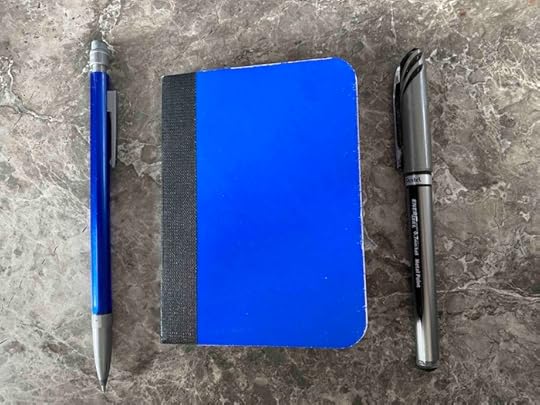
I keep a tiny notebook (3×4 inch) where I journal everything related to my health. You can find these at any department store for around $2. I recommend having a physical paper journal, not a digital archive, on your smartphone. Pencil and paper are very deliberative and access a different part of your brain.
What goes into this journal, and how did I discover the solution for my itch? Well, I use this journal as if I were conducting experiments. Over the years, this journal has made me healthier and happier. It has uncovered some remarkable things about my life simply because I chose to document it.
I’ve discovered some remarkable things about my life simply because I chose to deliberately document it.
For example, if I had a phenomenal sleep the night before, I’d record what I did and what I didn’t do.
Did I eat something sugary?
If so, what?
Did I use the hot tub or the infrared sauna a few hours before bed?
Did I have a cigar?
Thanks to this journal, I discovered that I couldn’t take a hot bath, a hot tub, or an infrared sauna too close to bedtime; otherwise, it would impact my sleep negatively.
I also discovered that having any sugar before bed created horrible nightmares.
The end result?
Better health.
Better sleep.
Better dreams.
Better performance in life.
Similarly, I have a medical cannabis prescription I use to help me with joint pain after gym workouts. (I’m over 50 now, so I’m no longer a spring chicken!) and I use this journal to document my body’s reaction to certain cannabis strains. Did it help with pain? How did it affect my sleep? Did it make me paranoid or help with writing?
Also, use this journal to record food-related reactions. Do you get terrible acid reflux after eating a vegan pizza with fake pepperoni? Falling asleep after a sushi lunch? Document it and adjust.
Key point: this journal aims to help you discover what activities, methods, behaviors, and foods keep you in optimal (or sub-optimal) conditions.
Health is wealth.
And a simple $2 investment can do light-years for your well-being.

PS: Regular twice-a-day use of an acupressure mat* helped me ultimately rid myself of my terrible itch. On some days that this itch was so bad, I dabbled in knives and pins for relief! Anyway, the itch was less intense on days when I used the acupressure mat. After about 10 days, it was completely gone!
Want to discuss this topic? Visit the Fastlane Entrepreneur forum and chat about it!
This article was from The Life in the Fastlane Newsletter. Click here to subscribe.



